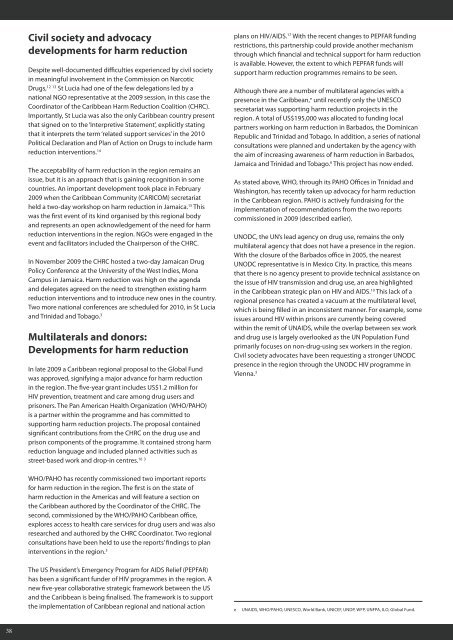The global state of harm reduction 2010: Key issues for broadening ...
The global state of harm reduction 2010: Key issues for broadening ...
The global state of harm reduction 2010: Key issues for broadening ...
Create successful ePaper yourself
Turn your PDF publications into a flip-book with our unique Google optimized e-Paper software.
Civil society and advocacy<br />
developments <strong>for</strong> <strong>harm</strong> <strong>reduction</strong><br />
Despite well-documented difficulties experienced by civil society<br />
in meaningful involvement in the Commission on Narcotic<br />
Drugs, 12 13 St Lucia had one <strong>of</strong> the few delegations led by a<br />
national NGO representative at the 2009 session, in this case the<br />
Coordinator <strong>of</strong> the Caribbean Harm Reduction Coalition (CHRC).<br />
Importantly, St Lucia was also the only Caribbean country present<br />
that signed on to the ‘Interpretive Statement’, explicitly stating<br />
that it interprets the term ‘related support services’ in the <strong>2010</strong><br />
Political Declaration and Plan <strong>of</strong> Action on Drugs to include <strong>harm</strong><br />
<strong>reduction</strong> interventions. 14<br />
<strong>The</strong> acceptability <strong>of</strong> <strong>harm</strong> <strong>reduction</strong> in the region remains an<br />
issue, but it is an approach that is gaining recognition in some<br />
countries. An important development took place in February<br />
2009 when the Caribbean Community (CARICOM) secretariat<br />
held a two-day workshop on <strong>harm</strong> <strong>reduction</strong> in Jamaica. 15 This<br />
was the first event <strong>of</strong> its kind organised by this regional body<br />
and represents an open acknowledgement <strong>of</strong> the need <strong>for</strong> <strong>harm</strong><br />
<strong>reduction</strong> interventions in the region. NGOs were engaged in the<br />
event and facilitators included the Chairperson <strong>of</strong> the CHRC.<br />
In November 2009 the CHRC hosted a two-day Jamaican Drug<br />
Policy Conference at the University <strong>of</strong> the West Indies, Mona<br />
Campus in Jamaica. Harm <strong>reduction</strong> was high on the agenda<br />
and delegates agreed on the need to strengthen existing <strong>harm</strong><br />
<strong>reduction</strong> interventions and to introduce new ones in the country.<br />
Two more national conferences are scheduled <strong>for</strong> <strong>2010</strong>, in St Lucia<br />
and Trinidad and Tobago. 3<br />
Multilaterals and donors:<br />
Developments <strong>for</strong> <strong>harm</strong> <strong>reduction</strong><br />
In late 2009 a Caribbean regional proposal to the Global Fund<br />
was approved, signifying a major advance <strong>for</strong> <strong>harm</strong> <strong>reduction</strong><br />
in the region. <strong>The</strong> five-year grant includes US$1.2 million <strong>for</strong><br />
HIV prevention, treatment and care among drug users and<br />
prisoners. <strong>The</strong> Pan American Health Organization (WHO/PAHO)<br />
is a partner within the programme and has committed to<br />
supporting <strong>harm</strong> <strong>reduction</strong> projects. <strong>The</strong> proposal contained<br />
significant contributions from the CHRC on the drug use and<br />
prison components <strong>of</strong> the programme. It contained strong <strong>harm</strong><br />
<strong>reduction</strong> language and included planned activities such as<br />
street-based work and drop-in centres. 16 3<br />
plans on HIV/AIDS. 17 With the recent changes to PEPFAR funding<br />
restrictions, this partnership could provide another mechanism<br />
through which financial and technical support <strong>for</strong> <strong>harm</strong> <strong>reduction</strong><br />
is available. However, the extent to which PEPFAR funds will<br />
support <strong>harm</strong> <strong>reduction</strong> programmes remains to be seen.<br />
Although there are a number <strong>of</strong> multilateral agencies with a<br />
presence in the Caribbean, e until recently only the UNESCO<br />
secretariat was supporting <strong>harm</strong> <strong>reduction</strong> projects in the<br />
region. A total <strong>of</strong> US$195,000 was allocated to funding local<br />
partners working on <strong>harm</strong> <strong>reduction</strong> in Barbados, the Dominican<br />
Republic and Trinidad and Tobago. In addition, a series <strong>of</strong> national<br />
consultations were planned and undertaken by the agency with<br />
the aim <strong>of</strong> increasing awareness <strong>of</strong> <strong>harm</strong> <strong>reduction</strong> in Barbados,<br />
Jamaica and Trinidad and Tobago. 6 This project has now ended.<br />
As <strong>state</strong>d above, WHO, through its PAHO Offices in Trinidad and<br />
Washington, has recently taken up advocacy <strong>for</strong> <strong>harm</strong> <strong>reduction</strong><br />
in the Caribbean region. PAHO is actively fundraising <strong>for</strong> the<br />
implementation <strong>of</strong> recommendations from the two reports<br />
commissioned in 2009 (described earlier).<br />
UNODC, the UN’s lead agency on drug use, remains the only<br />
multilateral agency that does not have a presence in the region.<br />
With the closure <strong>of</strong> the Barbados <strong>of</strong>fice in 2005, the nearest<br />
UNODC representative is in Mexico City. In practice, this means<br />
that there is no agency present to provide technical assistance on<br />
the issue <strong>of</strong> HIV transmission and drug use, an area highlighted<br />
in the Caribbean strategic plan on HIV and AIDS. 10 This lack <strong>of</strong> a<br />
regional presence has created a vacuum at the multilateral level,<br />
which is being filled in an inconsistent manner. For example, some<br />
<strong>issues</strong> around HIV within prisons are currently being covered<br />
within the remit <strong>of</strong> UNAIDS, while the overlap between sex work<br />
and drug use is largely overlooked as the UN Population Fund<br />
primarily focuses on non-drug-using sex workers in the region.<br />
Civil society advocates have been requesting a stronger UNODC<br />
presence in the region through the UNODC HIV programme in<br />
Vienna. 3<br />
WHO/PAHO has recently commissioned two important reports<br />
<strong>for</strong> <strong>harm</strong> <strong>reduction</strong> in the region. <strong>The</strong> first is on the <strong>state</strong> <strong>of</strong><br />
<strong>harm</strong> <strong>reduction</strong> in the Americas and will feature a section on<br />
the Caribbean authored by the Coordinator <strong>of</strong> the CHRC. <strong>The</strong><br />
second, commissioned by the WHO/PAHO Caribbean <strong>of</strong>fice,<br />
explores access to health care services <strong>for</strong> drug users and was also<br />
researched and authored by the CHRC Coordinator. Two regional<br />
consultations have been held to use the reports’ findings to plan<br />
interventions in the region. 3<br />
<strong>The</strong> US President’s Emergency Program <strong>for</strong> AIDS Relief (PEPFAR)<br />
has been a significant funder <strong>of</strong> HIV programmes in the region. A<br />
new five-year collaborative strategic framework between the US<br />
and the Caribbean is being finalised. <strong>The</strong> framework is to support<br />
the implementation <strong>of</strong> Caribbean regional and national action<br />
e<br />
UNAIDS, WHO/PAHO, UNESCO, World Bank, UNICEF, UNDP, WFP, UNFPA, ILO, Global Fund.<br />
38
















